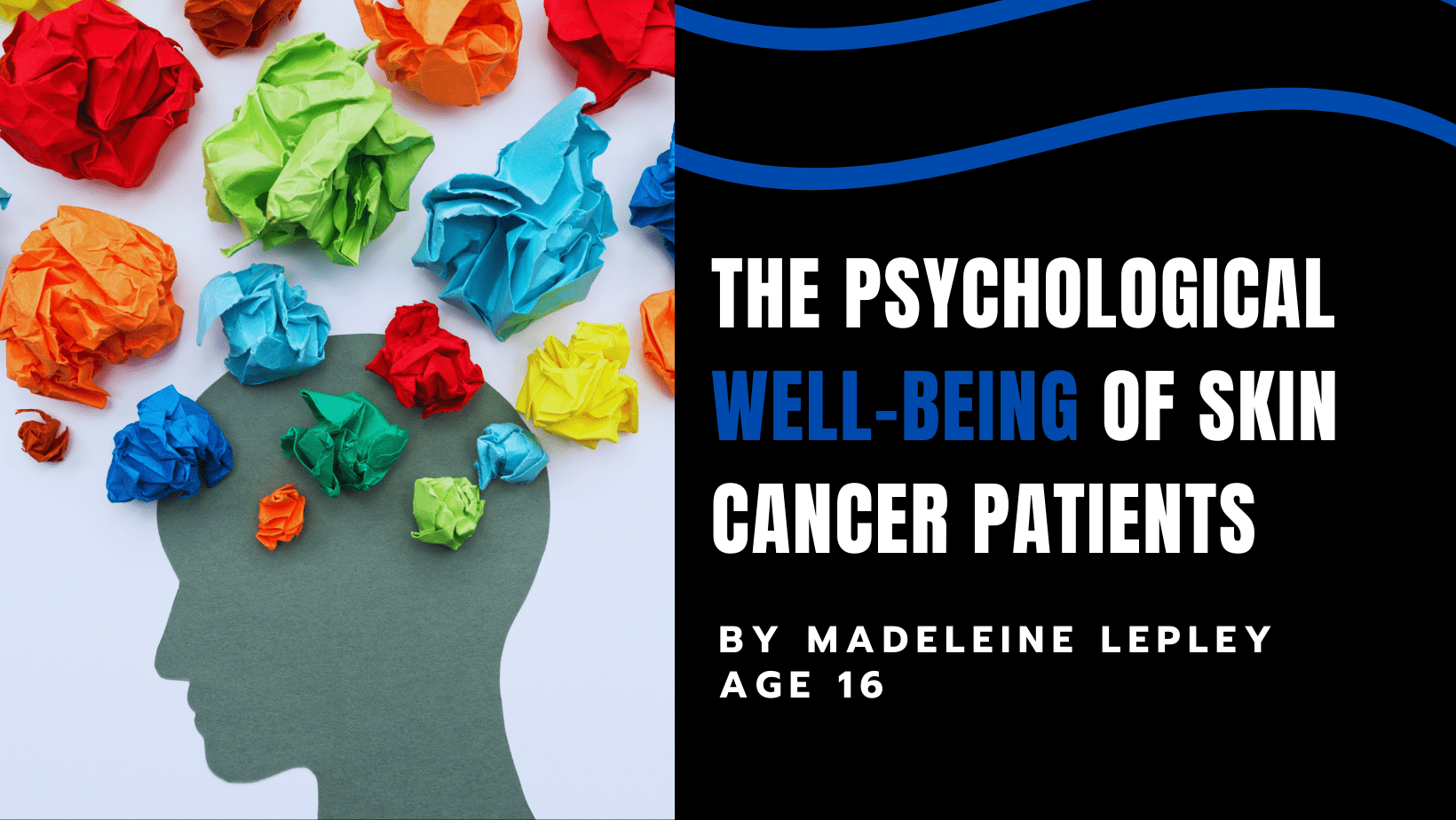The Psychological Well-Being of Skin Cancer Patients

By Alicia Rowell, Vice President
With a mom who is a professor of Research Methods in Applied Psychology at the University of Southern California, perhaps it’s not surprising that 16-year-old Madeleine Lepley is already dipping her toe in the research field.
Madeleine lives in Lexington, KY, and attends Lafayette High School, a public school near her home. Last year, her school offered AP Research for the first time, and as any good researcher’s daughter would, she signed up to take the course.
“This class definitely taught me a lot more about what she does,” Madeleine says. “I didn’t really know before what it was like to be a researcher.”
The bulk of the AP Research class was to research and write a paper on a topic of her choosing. She is interested in medicine and science, and she’d hoped to do medical research in a lab. But because of COVID, she had to do the entire course and required research over the internet and Zoom.
Madeleine has always had an interest in skin cancer—and melanoma especially. Her grandfather, with whom she is close, has had 12 melanomas over the last ten years. Her aunt, a cellular biologist, did her dissertation on skin cancer. So she chose psychology as a topic and specifically chose to look at contextual factors that impact the psychological well-being of skin cancer patients. From the introduction of her paper:
Skin cancer is one of the most frequently diagnosed cancers across the world and studies have shown that patients with low psychological well-being (PWB) may have a poorer disease prognosis. Many contextual factors (such as social support, personality, and age) have been found to be predictive of cancer patients’ PWB. This study aimed to answer the question: Which group of contextual factors (individual, medical, social, lifestyle, or environmental) is the most significant predictor of skin cancer patients’ psychological well-being?
She began the process with research and the careful creation of a survey. Then she contacted melanoma and skin cancer groups around the country, including AIM, to see if they’d help publicize the survey to get as many responses as possible.
We asked Madeleine to create a video about her research and we sent that video along with the survey link. Thanks to many in the AIM community and beyond, Madeleine had a robust response to her survey including participants from 43 states and 10 countries. It was open for approximately one month.
Then she set about analyzing the results and writing the paper. “The top six factors that were predictors of skin cancer patients’ psychological well-being were conscientiousness; social support; stage of skin cancer; neuroticism; agreeableness; and mindfulness,” Madeleine says.
She produced a 41-page paper that dives into her methods and these factors. Interestingly, she found that the factors above accounted for about half of the statistical variation of well-being among the patients. This also means that there are other factors that affect patients besides the ones she assessed, and future research could identify those. Future research could also address the “why.” Says Madeleine, “Another question for future research is why those factors impact psychological well-being.”
It was a sophomore year AP Biology class that hooked her on science. After that class, she knew she wanted to be in the medical field. “It was different from science classes I had taken before,” she says. Then she took anatomy, which also enthralled her.
In that anatomy class, she dissected a sheep brain and a pig kidney. Then she and her class did a full systems dissection of a cat. “It was so interesting to see the inside of the body, and to see how similar the systems are from animal to animal,” Madeleine says.
Madeleine is a rising high school senior who is already starting the college admissions process, as some applications are due in early November. Emory and Johns Hopkins are the top two schools on her wish list. Washington University in St. Louis is another school that is interesting to her. She knows she’ll be a pre-med major and then plans to earn an M.D./PhD. down the line.
But she still has one more year at Lafayette High School—her senior year. This year her classes include four APs and another research course. She’ll be busy, especially when you factor in the work for college applications.
Beyond her fascination with medicine, she runs cross-country, runs track, and plays tennis. She also loves traveling and learning foreign languages. Indeed, one of her upcoming classes is AP French, and it has made her think about doing medicine in other countries in the future.
Please read Madeleine’s paper, watch her video about her grandfather and her interest in skin cancer, and watch her video that summarizes her paper’s results.
We can’t wait to see what the future holds for you, Madeleine!
Recent Posts

Behavioral Addiction Responsible for Excessive Indoor Tanning

Announcing AIM at Melanoma’s Official Sunscreen Partner, WearSPF

Red Hair Genetics: 5 Things You May Not Know

Surviving & Thriving: From Melanoma Survivor to Sun Safety Advocate


